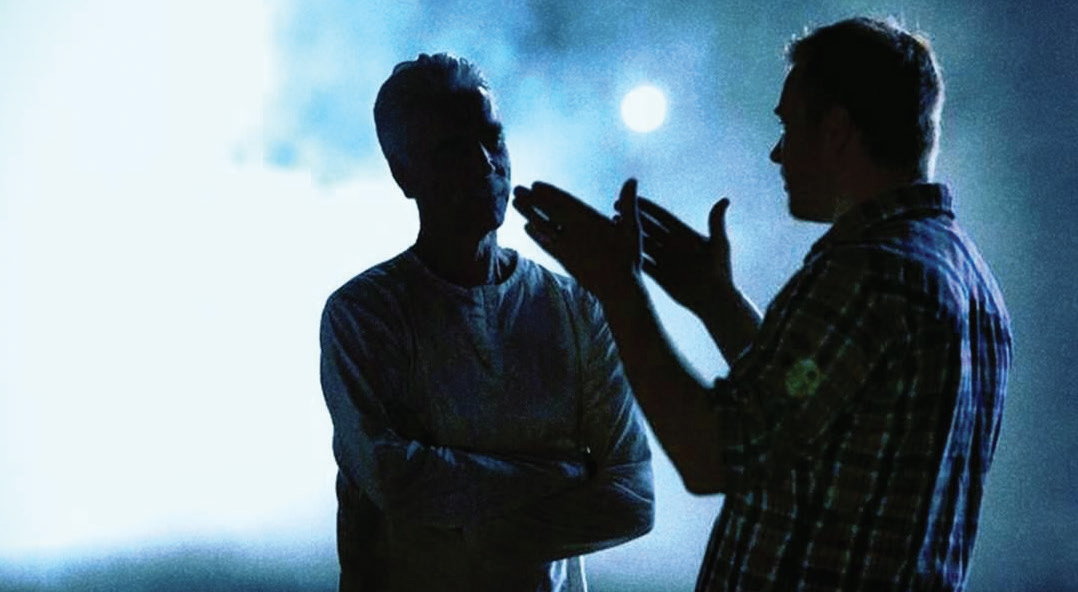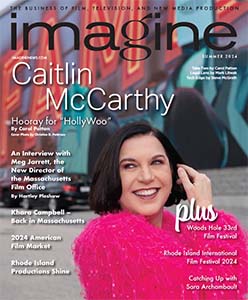By Hartley Pleshaw
You can’t tell a book by its cover, and, in that same spirit, it’s probably unwise to make assumptions about a film by its title.
A case in point would appear to be the new film THE MAN WHO KILLED HITLER AND THEN THE BIGFOOT. For most people, a cursory glance at that title would lead to assumptions that the attendant offering would be an exploitation film, a likely product of a cinematic schlock house.
But looks can be deceiving. And to make any assumptions about this particular film based on its title would be a grave self-deception indeed.
The film is in fact a deep character study, accompanied by frightening and alarmingly relevant metaphors. It is indeed a horror film, but as much about the horror within as without.
Two of the people who created it explain what THE MAN WHO KILLED HITLER AND THEN THE BIGFOOT is about.
The Director: Robert Krzykowski
This may be his first film as a director. But Robert Krzykowski came to the project—an original idea of his—with an enormous portfolio of experience. Robert was born in Albany, NY, but has spent most of his life (excepting periods in Hollywood as a screenwriter) in western Massachusetts, where he still lives. (And, at least in the case, works; THE MAN WHO KILLED HITLER AND THEN THE BIGFOOT was filmed in the Connecticut River Valley town of Turners Falls, Massachusetts).
He began to attend UMass, Amherst, but early recognition of his talent, and demands for it, led him to become a professional in film before he had a chance to graduate.
But now, with this film, Robert has earned the ultimate degree accomplishment in filmmaking: the graduation to Director.
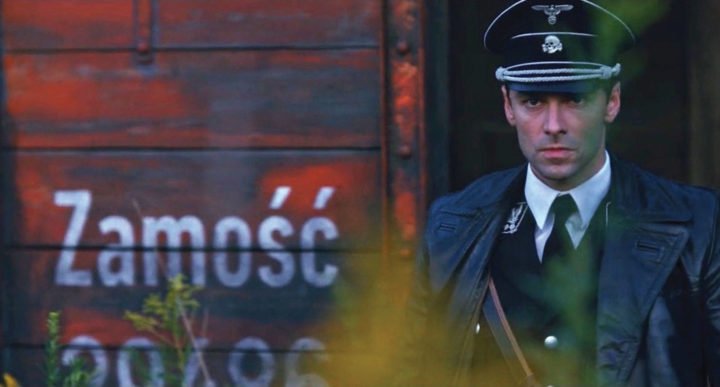
Aiden Turner as the young Calvin Barr in THE MAN WHO KILLED HITLER AND THEN THE BIGFOOT.
So, what does the curious-sounding title mean?
“It says so much, that it must be about something else. It can’t just be about that title! I thought that it was a clue to the audience that they could expect to discover another layer in this film.
“The initial theme that got me writing this was, I wrote the opening ten pages kind of the way you would start a James Bond movie. At the end of those ten pages, the hero killed Hitler. And then I realized, well, I have nowhere to go from here. That’s about as big as the script can get!
“But then I started thinking, well, Hitler was a monster; maybe (his killer) could go on to another monster. And who would that be?
“I got to thinking about Bigfoot: this kind of mythic, American notion of this fantastic creature against a human monster, in Hitler. I went back to the beginning, and typed ‘The Man Who Killed Hitler and Then the Bigfoot.’ That became my mission, to kind of work my way towards justifying that title. And in doing that, discovering this really sweet, awful, melancholy character at the heart of this story, and exploring his life, and everything he’s been through.
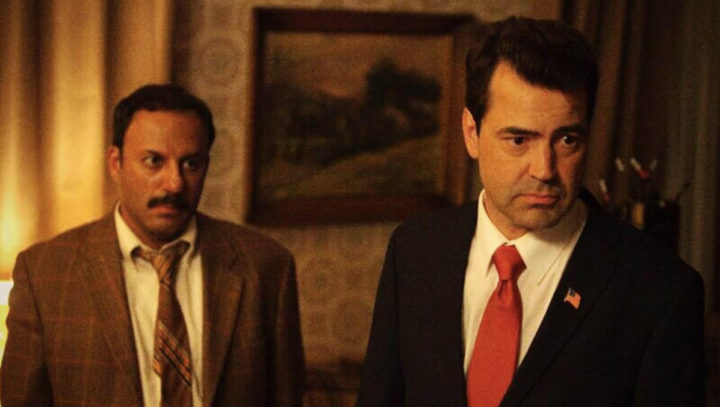
Still of Rizwan Manji and Ron Livingston on the set.
“So, it’s really about the man in that title: The man who killed Hitler, and then the Bigfoot.”
A man who, if one can at least temporarily disbelieve the agreed-upon history that Adolf Hitler killed himself in his underground bunker, committed a supremely heroic act, but was and remains unknown to history. A hero who wasn’t merely forgotten, but was never recognized to begin with—until, of course, he was needed again. A character very much in the tradition of another movie genre.
“He’s a classic, American mythic hero. Not unlike a Western (hero), or even a (character in a) Japanese samurai movie. A lonely, singular hero, tasked to do something that only he is capable of doing. And in doing that thing, it isolates him even further. There’s something very romantic about that kind of character.
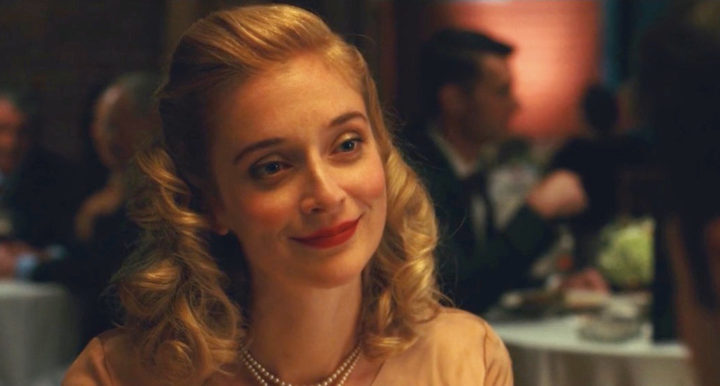
Still of Caitlin FitzGerald
“The movie seeks to also break down and analyze that. Both in the way that we romanticize this type of hero, and try to make him all the more human in studying him.
“At its heart, (this is) a character study.”
The film also employs a metaphor.
“Hitler is spreading a plague of ideas throughout World War II. That plague reached a lot of people. And that plague in some ways continues today. And I thought, this other monster in the movie, the Bigfoot, he’s spreading a plague as well. He’s spreading a literal plague. The Bigfoot spreading a literal plague brings our hero back into the picture, to try to stop it.
“The present and the past echo each other throughout the film.”
And so, Robert Krzykowski had his idea for a film. Now he had to make it a reality. This was no small task, particularly for a first-time director making an independent film. It wasn’t easy.
“The project was twelve years in the making. We hit a lot of walls in the process. I was told ‘NO’ many, many times. I got used to hearing ‘NO’ a lot more than I got to hear ‘YES.’
“But, one of about twenty people would say ‘YES,’ and become part of the project. And usually those people were incredibly special. Sometimes, they were all-time heroes of mine. Those included John Sayles, Lucky McKee, Douglas Trumbull, Richard Yuricich and Sam Elliott. There was a realization that this was worth fighting for. It wasn’t going to be easy, but we were going to try to stick to the script and make the thing that we set out to make.
“As I realized that this was going to happen, that this production was going to get underway in the summer of 2017, I felt an enormous amount of pressure. I felt very intimidated. I felt that no matter how much preparation I was doing, I could never be prepared enough.
“I knew the caliber of talent that was coming to Massachusetts to make this film. It made me work really, really hard. Once we got into production, it was really a matter of trusting all these great people who came around. And day by day, the pressure seemed to release a little bit. I could do more and more directing. I was a producer on the film as well.”
When it came time to cast the reluctant hero, Robert’s choice met his criteria.
“Our Casting Director Kellie Roy and I spent a considerable amount of time discussing who would be the right person to embody this character who has kind of this noble quality about him. I wanted somebody who could have stepped out of a Norman Rockwell painting. (Executive Producer) John Sayles and I talked quite a bit about whom that might be. He came out of a meeting one day, and said, ‘I think that Sam Elliott might be a really great choice for that part.’ Sam’s name had been mentioned before, but it really clicked that day. We reached out to Sam about two years ago, right around Thanksgiving. He got in touch with me, we had a long phone call, and at the end of the call Sam said, ‘I want to do this movie. I want to be a part of it.’
Sam Elliott had just finished work on what has turned out to be the most acclaimed film of 2018, A STAR IS BORN. Thus, for the second film in a row, he would be working for a first-time director.
But unlike that film’s rookie director, Bradley Cooper, Sam Elliot would now be working for a director who wasn’t an established figure in contemporary film.
“I think that showed a lot of courage on Sam’s part. It also shows that he does things because they speak to him, and because he wants to (do them). Sam explained to me that he never takes a project for the money, and never has. Through his entire career he’s done projects because they say something to him. He’s looking for something true in each project. And I know that that was something he discovered here.”
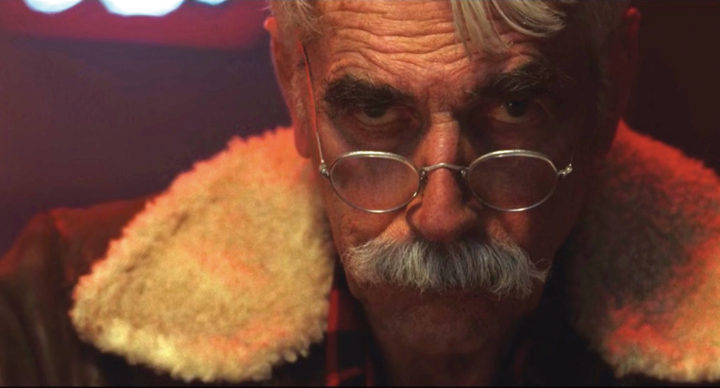
Sam Elliott as the elder Calvin Barr in THE MAN WHO KILED HITLER AND THEN THE BIGFOOT.
The Lead Actor: Sam Elliott
The face. The eyes. The mustache. And, perhaps, above all, the voice. In a world of increasingly
indistinguishable “celebrities,” you KNOW Sam Elliott.
And in 2018, you are likely more aware of him than ever. Now in his mid-seventies, Sam’s career has never been hotter. A STAR IS BORN is no doubt one reason. But that he could go from a very Hollywood project like that to an indie like THE MAN WHO KILLED HITLER AND THEN THE BIGFOOT—with a first-time director, no less—says much about his versatility, integrity and fearlessness.
Such being the case, he appears to have been a perfect choice to play the part of the film’s reluctant hero, Calvin Barr.
“I certainly was taken in by the script at the very beginning, because what’s in the film is really all on the page. There was no way that I could NOT do this film. In terms of Calvin’s character, it spoke to me on many, many levels.
“The whole thing that he was in the military. That speaks to me. The generation that he comes from speaks to me. Love lost, unrequited love, speaks to me.
“This man who killed Hitler and then the Bigfoot. To me there’s such goodness in Calvin Barr. There’s not a lot of it in the movies today. We’re beset by all this murder and mayhem, in the real world and on film. There’s was something about Calvin’s goodness that spoke to me.
“And his sadness—the sadness that he’s plagued by now.”
Like Robert Krzykowski, Sam Elliott sees something of the classic Western hero in Calvin Barr. The hero who saves the day, but neither gets nor wants the credit for his heroism.
“It’s clear that when the FBI guys come, and he has the conversation at the dining table with them that this was never something that he banked on or looked for. Being in the military, it’s what came to him. He was one of those guys who just stepped up. There are a lot of those people out there today. They join the military, and they’re there to answer the call.
“That’s what Calvin did. But he paid a dear price for it. He never reckoned, I don’t think, on killing
people. He was never comfortable with that. I have no doubt that he killed numerous people, being in the war that he was in. I can’t imagine that it was just Hitler.
“He lost the love of his life because he went off to war. He just didn’t bank on any of that.
“It’s the stuff that so many of us, I think, take for granted. The sacrifice that men and women make when they join the military. The cost that comes with it. Today, they call it PTSD (Post-Traumatic Stress Disorder). Back in Calvin’s day, I don’t know what they would have called it. It’s as real today as it was back then, and it’s as real as it was in the film. It’s something to reckon with.”
Sam Elliott thinks that independent films do reckon with such issues, unlike much of today’s Hollywood
product.
“The independent film world is a wonderful world to investigate real life in some ways. It just seems
to go so much deeper. There’s not a lot of money involved, not a lot of people in suits involved, trying to control the game.”
Robert Krzykowski kept control of HIS game, his film. According to Sam Elliott, as filming progressed,
the first-time director became increasingly skilled at his craft.
“I think that on some level, Bob might have been timid at the very beginning. A little overwhelmed by
it all, by the sheer fact that it had been such a long gestation period for his project. And then he had these incredible people behind him, the guys who stepped up. (Co-producers) John Sayles. Douglas
Trumbull. But after that, he just fell right into it. He was so specific. He knew what he wanted, and he knew how to go about getting it.
“He’s a collaborator, which to me is one of the things that puts him in the same field with Bradley
Cooper. Bradley is an incredible collaborator. And that’s the ideal situation for all of the creative
forces to be in.
“When you have a director who’s open, and who wants to communicate, and has a vision, and knows how to bring all the creative forces to achieve that vision together, then that’s the ideal situation.
By the time Sam Elliott had finished his work in both A STAR IS BORN and the Netflix TV series THE RANCH, his own situation was less than ideal. He was physically exhausted from his previous work, and wanted to rest. But Robert Krzykowski inspired Sam to take on the new project.
“I told Robert, ‘I want to come, but I just can’t make it now. I’m not up to it, physically or mentally. I’m not going to give you what I want to give you.’
And I pulled out of it. And he said, ‘it’s okay, I understand.’ We let it go.
“And then he wrote a letter to my agent. On an emotional level, it still gets me. This letter to my agent thanked him for all the time he put into it and for supporting the film, and trying to make it
work out. He wrote what a great representative he was for me, and that someday, we’ll be able to do something together. It was a long letter and well composed. Robert is a brilliant writer and speaker. He is a really smart, smart man.
“My agent forwarded me that letter. I read it, I thought about it most of that night. The next night I called Robert and said, ‘Hey, man, I’m comin’ up!’ I’ll do this movie with you.’
“It spoke volumes to me that Robert would thank my agent like that. I said to myself, ‘I just can’t let this kid down. If this guy really wants me to do this movie, I’ve GOT to do it!’ And I can’t tell you how thankful I am that I did.”
Sam Elliott is also very thankful that this film was shot in Massachusetts.
“For one, I was totally captivated by the countryside. I don’t know if I’ve ever been in more beautiful country, and I’ve seen some beautiful country.
“That rolling farmland and that valley right there in Deerfield was the most incredible country that
I’ve been in in a long time. And all those little towns! It’s mind-boggling to go through that country, and see all that breathtaking farmland and woodlands, and how beautiful it is. And this was in the spring and summer. It wasn’t in the fall, that everyone talks about.
“And the people were just as incredible. They were so friendly, and so welcoming.
“I loved it there. I want to stay at the Deerfield Inn again. I want to come back and bring my wife and spend some time.”
IMAGINE is sponsoring, hosting and presenting THE MAN WHO KILLED HITLER AND THEN THE BIGFOOT at the Somerville Theatre on November 15th.

